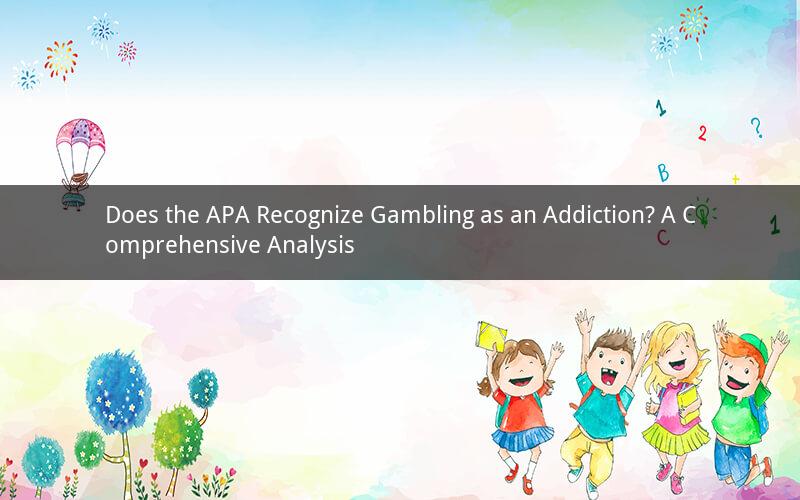
Introduction:
Gambling addiction has become a significant issue in recent years, affecting millions of individuals worldwide. The debate over whether gambling should be classified as an addiction has sparked intense discussions among researchers, clinicians, and policymakers. This article delves into the question of whether the American Psychological Association (APA) recognizes gambling as an addiction, exploring the evidence, arguments, and implications associated with this classification.
I. Understanding Gambling Addiction
1. Definition of Gambling Addiction
Gambling addiction, also known as problem gambling or compulsive gambling, refers to a chronic and progressive condition characterized by an inability to control or stop gambling despite harmful consequences. It involves a compulsive urge to gamble, resulting in significant distress and impairment in various aspects of life, including work, relationships, and finances.
2. Signs and Symptoms of Gambling Addiction
Several signs and symptoms indicate the presence of gambling addiction. These include:
a. Inability to control gambling behavior
b. Preoccupation with gambling, even when not engaged in the activity
c. Increasing amounts of money and time spent on gambling
d. Repeated failed attempts to stop gambling
e. Risking or losing relationships, jobs, or education
f. Engaging in illegal activities to fund gambling
g. Withdrawal symptoms when attempting to stop gambling
II. The APA's Perspective on Gambling Addiction
1. APA's Classification of Gambling Addiction
The APA, a leading authority in psychology, recognizes gambling addiction as a mental health disorder. In the fifth edition of the Diagnostic and Statistical Manual of Mental Disorders (DSM-5), gambling addiction is classified under the category of "Addictive Disorders."
2. Arguments Supporting APA's Classification
Several arguments support the APA's classification of gambling addiction as a mental health disorder:
a. Shared Characteristics with Other Addictions
- Similarities in brain chemistry and neural pathways
- Similar patterns of compulsive behavior and relapse
b. Prevalence and Impact of Gambling Addiction
- Widespread occurrence of gambling addiction, affecting millions globally
- Negative consequences on individuals, families, and society
c. Evidence-Based Treatments for Gambling Addiction
- Existence of effective treatments, such as cognitive-behavioral therapy (CBT) and support groups
III. Implications of APA's Classification
1. Increased Awareness and Research
The APA's classification of gambling addiction as a mental health disorder has led to increased awareness and research in this field. This has resulted in a better understanding of the disorder, its causes, and potential treatment approaches.
2. Improved Access to Treatment
With the recognition of gambling addiction as a mental health disorder, individuals seeking treatment now have better access to evidence-based interventions. This includes therapy, support groups, and resources tailored to address the specific needs of gambling addicts.
3. Policy and Legal Implications
The APA's classification of gambling addiction has implications for policymakers and legal authorities. It may influence regulations surrounding gambling industries, as well as the development of public health strategies aimed at preventing and treating gambling addiction.
IV. Frequently Asked Questions about APA's Recognition of Gambling Addiction
1. Question: What is the difference between problem gambling and gambling addiction?
Answer: Problem gambling refers to any gambling behavior that causes harm or distress to an individual, while gambling addiction is a more severe and chronic condition characterized by an inability to control gambling despite negative consequences.
2. Question: Can gambling addiction be treated?
Answer: Yes, gambling addiction can be treated effectively. Evidence-based treatments, such as cognitive-behavioral therapy (CBT) and support groups, have been found to be effective in helping individuals overcome their addiction.
3. Question: Is gambling addiction a mental illness?
Answer: Yes, the APA recognizes gambling addiction as a mental health disorder. It shares many similarities with other addictive disorders and is characterized by compulsive behavior and negative consequences.
4. Question: Can someone recover from gambling addiction?
Answer: Yes, recovery from gambling addiction is possible. With appropriate treatment, support, and personal commitment, individuals can overcome their addiction and lead fulfilling lives.
5. Question: How can I seek help for gambling addiction?
Answer: Individuals struggling with gambling addiction can seek help from mental health professionals, support groups, and treatment centers specializing in gambling addiction. It is essential to reach out for support to address the underlying issues and develop healthier coping mechanisms.
Conclusion:
The APA's recognition of gambling addiction as a mental health disorder has significant implications for understanding, treating, and addressing this complex issue. By acknowledging the severity of gambling addiction, the APA has paved the way for increased awareness, research, and access to effective treatment options. As society continues to grapple with the challenges of gambling addiction, the APA's classification serves as a crucial step towards promoting the well-being of affected individuals and their communities.